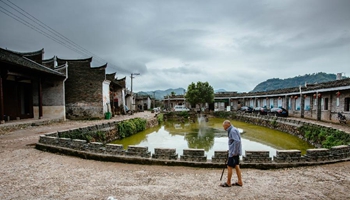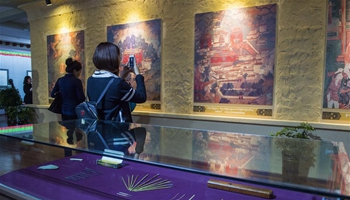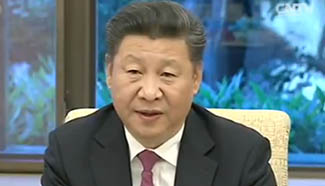By Xinhua writer Yuan Quan
BEIJING, July 13 (Xinhua) -- China was once known as the "Bicycle Kingdom" -- before two wheels were dethroned by four.
Now a young American living in Beijing is using his ingenuity and pieces of bamboo to restore the sovereignty of the humble bike.
Two years ago, David Wang opened the "Bamboo Bicycles Beijing" workshop in Langjia Hutong, where he leads a team each weekend in cutting and shaping bamboo into bicycle frames. After connecting the pieces with hemp fibers and epoxy glue, they attach wheels, brakes and handlebars.
The bikes are not for sale -- they are to encourage a renewed love of cycling among city dwellers.
Wang, 29, hopes the light, shock-absorbing bamboo bicycles can create "a little bit more diverse mobility culture in Beijing".
BICYCLE GRAVEYARD
Wang was born to a father from Hong Kong and a mother from the United States. After graduating from the Massachusetts Institute of Technology, he came to China to continue his study of anthropology.
He has lived in Beijing for over six years, loving the city's ancient hutongs, which are "constantly changing."
But he noticed a growing number of abandoned bikes collecting in the alleyways, with people throwing away old and broken bicycles with the rest of the garbage.
"Beijing is becoming a big graveyard of bicycles," says Wang.
He began picking up the abandoned bikes and "rescuing" them, stripping them down, repairing, repainting, and renovating them.
Then one day he found a very rusty bicycle, which could not be "cured", so he began thinking of better materials to replace the frame. Bamboo came to mind.
He Googled the method, and after three months of research and experimenting, contacting factories and experts, he made his first bamboo bicycle.
"It was amazing," he recalls. "Everybody asked questions about it." Since then, Wang has become convinced that bamboo is better than steel for safety, performance and sustainability.
He traveled to Taiwan, where bamboo craftsmanship goes back centuries, consulting local technicians, visiting bamboo cultural centers, and asking advice from experts on how to choose, keep and connect bamboo pieces.
Returning to Beijing, he became more confident and his bamboo bicycles won acclaim in the cycling community and many followers.
STATUS SYMBOLS A bicycle was a symbol of wealth and social position when they first arrived in China.
They first appeared in the Forbidden City as a Western tribute to the Qing Dynasty rulers. About 100 years ago, Aisin-Gioro Puyi, China's last emperor, ordered the thresholds of many gates in the palace to be sawn off, so he could ride his bike without obstacles.
In 1950, the first Chinese bicycle - a "Flying Pigeon" - was made in Tianjin. Up to the 1970s, women often demanded a bicycle, a radio and a sewing machine before they would accept a marriage request.
As living standards improved, bicycles became more common. Pictures of large groups of cyclists, described as a "Moving Great Wall", became iconic images of the "Bicycle Kingdom".
However, bikes have failed to keep up with the accelerating economy.
According to Beijing transport authorities, bicycles accounted for 63 percent of trips in Beijing in the 1980s, but that dropped to 17.8 percent in 2014. The lack of bicycle lanes and barriers between cyclists and motorists are the main reasons of the downward trend.
A survey released this month by Beijing Municipal Commission of Transport showed that 31.5 percent of trips were made by car - down from 33.6 percent in 2010. But the number of cars keeps rising. Last year, 23.85 million new cars were registered in China, taking car ownership up to 172 million, the second largest in the world after the US.
"Four wheels" is the new status symbol, while those on two wheels are often stereotyped as poor. "Bicycles are misunderstood as a low-end mode of transport," says Wang.
"I want to make a difference."
MOBILITY CULTURE
Wang quit his previous job in 2014 to launch his bicycle career. Two years on, he has a website and a community that organizes picnics, rides and other gatherings.
Wang rejects mass production and its potential profits. He believes the beauty of the bamboo bicycle is that everyone can make their owns. A self-made bicycle will encourage its maker to ride more.
"We are not just teaching people to make their own bicycles out of bamboo, but, more importantly, we're encouraging a lifestyle and mobility culture that express our hope for a sustainable city", says Wang.
Most of his workshop participants were expats at first, but more young Chinese are joining.
Before joining the workshop last year, Xiao Luo was a repairman at a bicycle shop in Guangzhou. When he first saw Wang's bamboo bicycles, he was exhilarated, not only because they were made of bamboo, but also they were handcrafted.
He says the workshop gives him a sense of pride that making a bicycle is a craft that deserves respect.
"I never imagined I would make a bicycle myself. It seems that a little technician has grown into a craftsman."
Dong Sheng was one of members making the first batch of the bikes. He remembers riding to Tian'anmen Square, where they found the bike lanes so wide. "We finally find the dignity of cyclists," he recalls happily.










